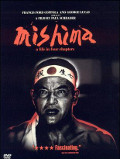
Directed by
Paul Schrader
121 minutes
Rated MA
Reviewed by
Bernard Hemingway

Mishima: A Life in Four Chapters
Paul Schrader’s elliptical biopic of celebrated twentieth-century Japanese author Yukio Mishima is a splendidly-mounted film produced with a largely Japanese team by Francis Ford Coppola and George Lucas whose association as executive producers on Kurosawa’s Kagemusha (1980) led to this film.
The film relates Mishima’s life in four segments which shift between black and white sections which depict the author’s memories; gorgeously staged re-imagings thereof drawn from three of Mishima’s novels, “The Temple of the Golden Pavilion”, “Kyoko's House”, and “Runaway Horses” provided by production designer Eiko Ishioka (who did similar honours for Coppola's Bram Stoker's Dracula); and the events of 25 November 1970, the day on which Mishima committed seppuku or ritual suicide while one of his followers beheaded him (which fortunately we don’t see).
Whilst skilfully-crafted Mishima is not without its problems. Phillip Glass’s overbearing music is out-of-step with Schrader’s relatively restrained direction. For some unknown reason Roy Schieder provides the narrating voice of the fictionalized Mishima. More generally, there is something pathetically perverse in Mishima’s aspiration to restore samurai values to Japan. Somewhat oddly Schrader manages to accentuate this, having Mishima drive to his death at an army base squashed in a tatty old sedan with his four callow followers, take a general hostage in a near comedy fracas, then address a jeering garrison of soldiers with no interest in what he has to say. Frankly anyone in their right mind would have packed it in but Mishima goes ahead with his shocking act of self-sacrifice. That his act doesn’t carry any affect for us points to the film’s emotional detachment and failure to get "inside' the author who was a cult figure in his day.
For all that Mishima is an impressively ambitious film of considerable merit.
FYI: The 2008 Criterion DVD release has Ken Ogata, the actor who plays Mishima on screen providing the narration, adds a small scene dleted from the 2001 version and restores the film to its original ratio of 1.85:1 as well as improving the colour registration,
Want something different?





